ORC Staff and Councillors held an afternoon tea in the Council Chambers for recipients of the past two rounds of the ECO Fund, to celebrate and share ideas with other recipients.
Councillor Michael Deaker presented the grant recipients with certificates to formally acknowledge their project funding. “The ECO Fund was set up to support our community in looking after Otago’s environment. All of these groups have had amazing collaboration with their communities which is why we are so pleased to support them”, Deaker said.
The ECO (Environment. Community. Otago) Fund is an ORC initiative started in 2018 to support community-driven projects that protect and enhance Otago's environment. To date, ORC has provided $166,666 to ECO Fund recipients.
Sally Carson, who represents one of the groups that received funding, from the New Zealand Marine Studies Centre said, “For us, the ECO Fund grant provides an opportunity for local communities to learn more about their coastal neighbours and develop understanding of how their activities may impact on this environment. We’re really thankful to ORC for the funding.”
ECO Fund Recipient Gina Huakau, of the Tomahawk Smaills BeachCare Trust, said the funding was like an endorsement from a local agency: “It’s great to have regional council backing for our project.”
Andrew Innes, a recipient from the group ECOTAGO Charitable Trust, said that the funding would help the group do more independent research. “ECO Fund definitely helps the project happen. It’s really helped as we have our own water testing station, and some of the funding has gone to managing that, making it fit for purpose.”
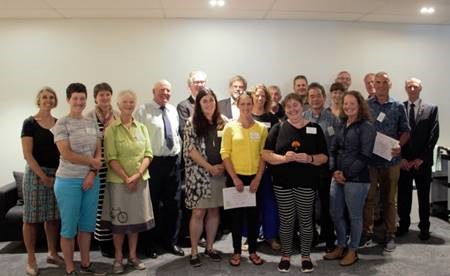
ECO Fund recipients and Otago Regional Council Councillors, Cr Carmen Hope, Cr Sam Neill, Cr Michael Deaker, Cr Trevor Kempton, Cr Ella Lawton, Cr Graeme Bell, Cr Bryan Scott, Chairman Stephen Woodhead.
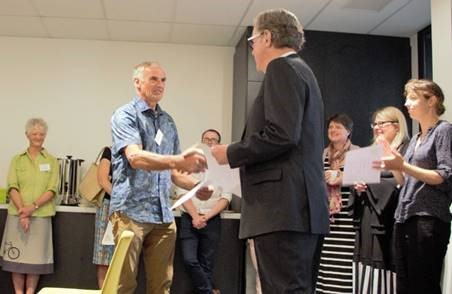
Cr Michael Deaker and Ian Bryant Trust Chair of Te Nohoaka o Tukiauau/Sinclair Wetlands
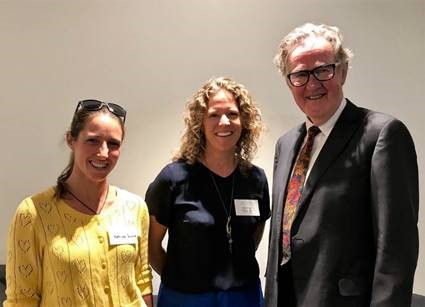
Cr Michael Deaker with Sally Dicey and Katrina Jones from the Tomahawk Smaills Restoration Project
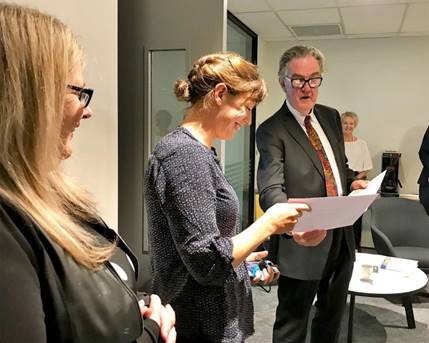
ORC Chief Executive Sarah Gardner, Cr Michael Deaker and Claire Concannon from the Wild Dunedin Podcast
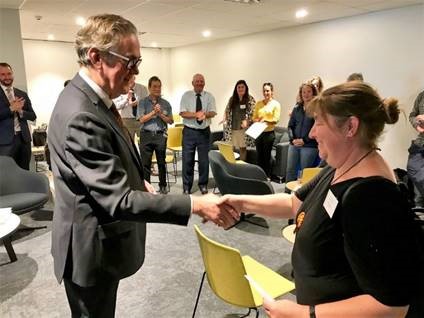
Cr Michael Deaker and Nik Hurring from Project Kereru
Further information on January ECO Fund recipients:
Invasive weed control at Te Nohoaka o Tukiauau Sinclair Wetlands
$13,000 towards the cost to control invasive weeds (e.g. grey willow, crack willow, glyceria) which will assist with habitat restoration in Te Nohoaka o Tukiauau/Sinclair Wetlands. The Wetlands has a high degree of naturalness, a diversity of indigenous flora and fauna, and provides habitat for threatened and wetland-dependant species (mātātā/fernbird, koitareke/marsh crake, matuku-hūrepo/bittern, pūweto/spotless crake). Invasive incursions of grey and crack willows and glyceria affect biodiversity by competing with native species and disrupting the natural water movement within the wetlands. Click here to see Sinclair Wetlands website for more information.
Monitoring Coastal Change in Otago with Marine Metre Squared
$15,656 to enable the New Zealand Marine Studies Centre to introduce Marine Metre Squared tools for schools and the wider community along coastal Otago to monitor change on their local coast over time and train schools and community groups in the use of these monitoring tools through workshops and field days. Click here to see the NZ Marine Studies Centre’s website for more information.
Save The Otago Peninsula
$7,379 towards control of a large infestation of the invasive weed banana passionfruit on the Otago Peninsula. This work will prevent seeding of banana passion fruit into 2 native forest covenants, 2 privately owned revegetation projects and an extensive area of nearby native planting. Click here for more information on Save The Otago Peninsula.
Silt fencing trial to reduce soil in waterways
$2,500 towards making sediment fences available to farmers in the Waiwera and Kaihiku catchment group to use next to cultivated land to reduce sediment runoff in high rainfall events. Their goal is to reduce sediment and therefore phosphorus getting into the Waiwera and Kaihiku streams. Ultimately improving the quality of the Waiwera and Kaihiku streams.
Skink Friendly Garden
$1,770 to restore Weston School’s Skink Friendly Garden. The garden was built in 2013 to protect their local Southern Grass skinks and McCann’s skinks. However, they have had some trouble with predators, so a new fence is needed along with more native plantings and rock piles for the skinks habitat. The school will also install traps around the garden with chew cards, so the students can learn where the predators are coming from.
Te Kākano Aotearoa Trust
$15,000 to improve on the work currently done by Te Kākano nursery staff, allowing them to run more nursery, plant watering and maintenance sessions, develop more resources for schools and respond more effectively to the increasing number interest the nursery is gaining. Click here to see their website for more information.
Wanaka Water Project
$12,500 towards the costs of a project leader for the Wanaka Water Project. The Wanaka Water Project undertakes strategic riparian planting, research on the effects of urban stormwater in partnership with the University of Otago and the development of a community-led integrated catchment management plan. Click here to see their website for more information.
Water Quality Testing Kit
$3,361 to purchase an instrument (HACH DR 900 colorimeter) to test nitrogen, phosphorus and ammonia in water. The instrument will add to the NZ Landcare Trust's water quality sampling kit, and will be used by catchment groups, individual farmers, school groups and staff from other organisations to help determine and explain water quality and stream health. Click here to see more their website for more information.
Wild Dunedin Podcast
$2,500 towards the cost of running the Wild Dunedin Podcast. The Wild Dunedin podcast helps engage and unite a largely urban population with conservation issues, helping them envisage a sustainable future for our region, in which they can play their part. Click here to have a listen to the podcast.
The ORC’s ECO Fund next funding round takes place 1-20 May 2019.
For more information on projects funded by ORC and how to apply to the ECO Fund, visit www.orc.govt.nz/ecofund
Please contact media@orc.govt.nz to request higher quality photos for publication.
FOR FURTHER INFORMATION CONTACT
Emma Schranz
ORC Senior Media Advisor
0276 275 894
